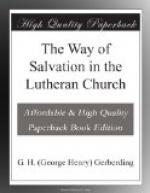CHAPTER IV.
BAPTISM, A DIVINELY APPOINTED MEANS OF GRACE.
When we inquire into the benefits and blessings which the Word of God connects with baptism, we must be careful to obtain the true sense and necessary meaning of its declarations. It is not enough to pick out an isolated passage or two, give them a sense of our own, and forthwith build on them a theory or doctrine. In this way the Holy Scriptures have been made to teach and support the gravest errors and most dangerous heresies. In this way, many persons “wrest the Scriptures to their own destruction.” On this important point our Church has laid down certain plain, practical, safe and sound principles. By keeping in mind, and following these fundamental directions, in the interpretation of the divine Word, the plainest searcher of the Scriptures can save himself from great confusion, perplexity and doubt.
One of the first and most important principle, insisted on by our theologians and the framers of our Confessions, is that a passage of Scripture is always to be taken in its natural, plain and literal sense, unless there is something in the text itself, or in the context, that clearly indicates that it is intended to convey a figurative sense.
Again: A passage is never to be torn from its connection, but is to be studied in connection with what goes before and follows after.
Again—and this is of the greatest importance—Scripture is to be interpreted by Scripture. As Quenstedt says: “Passages which need explanation can and should be explained by other passages that are more clear, and thus the Scripture itself furnishes an interpretation of obscure expressions, when a comparison of these is made with those that are more clear. So that Scripture is explained by Scripture.”
According to these principles, we ought never to be fully certain that any doctrine is scriptural, until we have examined all that the divine Word says on the subject. In this manner then we wish to answer the question with which we started this chapter: What is written as to the benefits and blessings conferred in baptism?
We have already referred to the commission given to the Apostles in Matt, xxviii. 19. We have seen that in that commission our Lord makes baptism one of the means through which the Holy Spirit operates in making men His disciples. In Mark xvi. 16, he says: “He that believeth and is baptized shall be saved.” In John iii. 5, he says: “Except a man”—i.e., any one—“be born of water and of the Spirit, he cannot enter the kingdom of God.” In Acts ii. 38, the Apostle says: “Repent and be baptized every one of you for the remission of your sins.” Acts xxii. 16: “Arise and be baptized, and wash away thy sins, calling on the name of the Lord.” Romans vi. 3: “Know ye not that so many of us as were baptized into Christ, were baptized into His death.”




